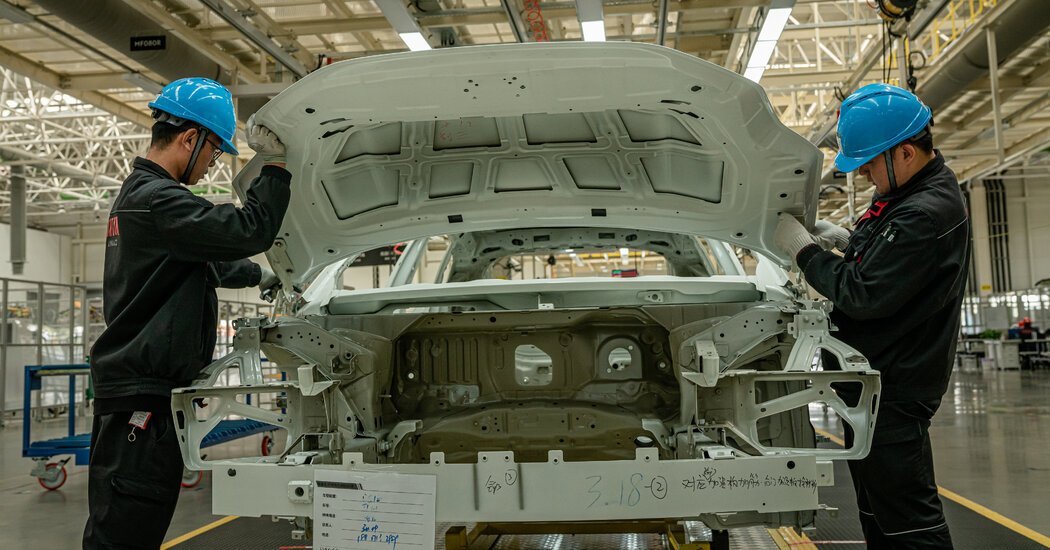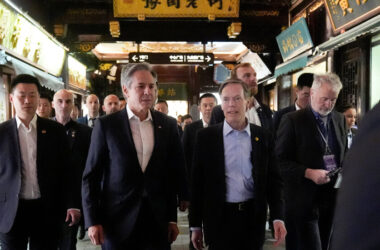The Biden administration is set to announce new tariffs as high as 100 percent on Chinese electric vehicles and additional import taxes on other Chinese goods, including semiconductors, as early as next week, according to people familiar with the matter.
The move comes amid growing concern within the administration that Mr. Biden’s efforts to jump-start domestic manufacturing of clean energy products could be undercut by China, which has been flooding global markets with cheap solar panels, batteries, electric vehicles and other products.
The long-awaited tariffs are the result of a four-year review of the levies that President Donald J. Trump imposed on more than $300 billion of Chinese imports in 2018. Most of the Trump tariffs are expected to remain in place, but Mr. Biden plans to go beyond those by raising levies in areas that the president showered with subsidies in the 2022 Inflation Reduction Act.
That includes Chinese electric vehicles, which currently face a 25 percent tariff. The administration is expected to raise that to as much as 100 percent in order to make it prohibitively expensive to buy a Chinese E.V.
Mr. Biden has previously raised concerns about Chinese electric vehicles, saying that internet-connected Chinese cars and trucks posed risks to national security because their operating systems could send sensitive information to Beijing. He took steps earlier this year to try to block those vehicles from entering the United States.
The president is looking to ratchet up pressure on China and demonstrate his willingness to protect American manufacturing ahead of his face-off against Mr. Trump in the November presidential election.
The fate of the China tariffs has been the subject of intense debate within the White House since Mr. Biden took office, with economic and political advisers often clashing over how to proceed. But this year China has begun ramping up production of the same products — electric vehicles, lithium batteries and solar panels — that the Biden administration has been investing billions of dollars to start producing in the United States. Beijing’s move has re-inflamed trade tensions between the two countries, compelling Mr. Biden to press ahead with more aggressive trade restrictions.
Mr. Trump has said he would escalate his trade war with China if re-elected and said this year that he was considering imposing tariffs of 60 percent or more on Chinese imports. In March, Mr. Trump said he would impose a 100 percent tariff on cars made in Mexico by Chinese companies.
The scale of the Biden administration’s tariffs, which are expected to be applied to Chinese electric vehicles, batteries and solar products, is not clear. The new tariffs on Chinese electric vehicles are not expected to apply to traditional gasoline-powered cars that are made in China, according to a person familiar with the plans.
The planned release of the review, which is being conducted by the Office of the United States Trade Representative, was reported earlier by Bloomberg News.
Strategic tariffs are also expected to include new levies on semiconductors, which Mr. Biden sought to boost in the bipartisan CHIPS and Science Act, a 2022 law that includes grants and other incentives for chip-makers.
Some Democrats, including Senator Sherrod Brown of Ohio, have been urging the Biden administration to take more drastic measures to protect the U.S. automobile industry. Last month, Mr. Brown called for Chinese electric vehicles to be barred from the United States, arguing that they pose an “existential threat” to American carmakers, and on Friday he said import duties were insufficient.
“Tariffs are not enough,” Mr. Brown wrote on the social media platform X. “We need to ban Chinese EVs from the US. Period.”
Mr. Biden said last month that he was asking the trade representative, as part of the review, to also raise tariffs on imported steel and aluminum products from China. The president and his aides have accused the Chinese of selling heavy metals at artificially low prices worldwide in order to gobble up market share, to the detriment of American producers.
“My U.S. trade representative is investigating trade practices by the Chinese government regarding steel and aluminum,” Mr. Biden told steelworkers in Pittsburgh, referring to Katherine Tai, who heads the office. “If that investigation confirms these anticompetitive trade practices, then I’m calling on her to consider tripling the tariff rates for both steel imports and aluminum imports from China.”
The president added: “I’m not looking for a fight with China. I’m looking for competition — and fair competition.”
The U.S. solar industry has also been lobbying the Biden administration to impose new tariffs on Chinese imports as an influx of cheap solar panels and components has caused prices in that sector to drop by around 50 percent over the last year. Last month, a group of seven leading solar manufacturers filed trade complaints formally requesting that the Biden administration impose tariffs on solar products being imported to the United States from Southeast Asia, where Chinese companies have relocated their operations to avoid existing tariffs.
“We are hopeful the tariff review is done with an eye toward aligning tariffs with strategic priorities including the continued build out of domestic solar manufacturing,” said Philippa Martinez-Berrier, a spokeswoman for the Solar Energy Manufacturers for America coalition
The prospect of the United States imposing new China tariffs was criticized in Beijing on Friday. The spokesman for China’s Ministry of Foreign Affairs, Lin Jian, said that the Trump administration’s tariffs “severely disrupted normal trade and economic exchanges between China and the U.S.” and argued that they were in violation of the World Trade Organization’s rules.
“Instead of ending those wrong practices, the U.S. continues to politicize trade issues, abuse the so-called review process of Section 301 tariffs and plan tariff hikes,” Mr. Lin said, referring to the legal provision that Washington is using to justify the tariffs. “China will take all necessary measures to defend its rights and interests.”
In 2020, during the Trump administration, the United States and China agreed to a sweeping “Phase 1” trade agreement that allowed each of the two countries to review their bilateral tariffs after four years. That bilateral agreement remains in force, but the United States deferred the outcome of its review when the four-year mark came up in January.
That pact probably gives Washington the latitude to increase tariffs. Beijing never complied with that agreement’s specific targets for Chinese imports of American manufactured goods, initially citing the onset of the pandemic. It later pursued a policy of replacing imports with domestic production.
Greta Peisch, a former general counsel at the U.S. trade representative’s office who helped oversee the trade investigation for the Biden administration, noted that the European Union was also weighing new tariffs on Chinese electric vehicle imports, and that the anticipated action by Washington was the result of China’s persistently aggressive trade policies. Without higher tariffs, she said, the U.S. auto sector will not be able to compete with heavily subsidized Chinese electric cars.
“When you look at the impact of China’s longstanding policies on E.V.s, they are producing much more and have a lot more capacity than they can absorb,” Ms. Peisch said. “You really want to go high enough to make sure that you’re counteracting the trend that we’re seeing.”
Keith Bradsher contributed reporting.




